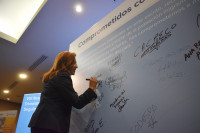USAID and WOCCU Highlight ‘Migrant Integration Through Economic Inclusion'
Eighth quarterly meeting of Economic Inclusion Project (EIP) shows how partner organizations and allies are utilizing EIP methodologies, guaranteeing the sustainability of migrant integration
February 24, 2023
LIMA, Peru—The USAID/World Council of Credit Unions’ Economic Inclusion Project (EIP) in February shared how it has generated opportunities for nearly 100,000 Venezuelan migrants, as well as local, vulnerable populations in Peru and Ecuador during events organized in both countries for the eighth quarterly meeting of the project, presented under the theme “Migrant Integration Through Economic Inclusion”.
Danielle Spinard, Director of the Regional Migration and Health Office of USAID Peru, highlighted sustainability and compassion as key elements vital to assisting vulnerable communities that seek opportunities to become part of the workforce in their host countries.
With representatives from more than 50 financial entities, organizations that support livelihood programs, government institutions, bilateral agencies and universities on hand for the events, EIP Chief of Party Óscar Guzmán thanked the institutions that have worked with project to help more than 98,000 people achieve some form of financial inclusion—65% of whom are women. 7,649 participants are entrepreneurs—90% of whom reported that assistance from the Economic Inclusion Project helped them improve their businesses.
The events also included panel discussions with representatives from government agencies that share a common goal of strengthening local capacities to achieve the sustainability of the actions promoted by EIP. That included both the Peruvian and Ecuadorian Ministries of Production, Peru's Superintendency of Migrations, Peru’s Superintendency of Banking, Insurance and Private Pension Fund Administrators, and Ecuador’s Superintendency of Popular and Solidarity Economy.
“Financial education is doing something for someone else; so, granting the credit unions and their associates access to financial education through digital platforms such as the ‘Yo Decido: Mi futuro y mis finanzas’ (I Decide: My Future and My Finances) program is democratizing financial education for the 6.6 million Ecuadorians that are part of the credit union industry, which make up 56% of the adult population in the country,” said Margarita Hernández, Ecuador’s Superintendent of Popular and Solidarity Economy.
A separate panel for EIP participants featured meaningful testimonies, like the one of Yureixi Zapata, a Venezuelan communicator who now lives in Lima and received support for her degree revalidation process. Zapata, who was sick from COVID-19 twice, explained how EIP assistance helped her overcome the impacts of the illness.
“The first time (with COVID-19) I didn’t have any medical insurance nor a formal job, I felt like dying, it was terrible. Thank God I got over it and I decided I couldn’t live like that. I reached out for help to revalidate my professional degree, to look for a job, and I came to USAID and WOCCU. The second time that I tested positive for COVID, I could receive medical assistance because I was working at an important enterprise. Now I have medical insurance and all the social benefits,” said Zapata.
Yelitse Barrios, a Venezuelan woman living in Quito, Ecuador, shared how she started an associate entrepreneurship after finishing the “Emprende UNIDAS” program.
“Everything that they have given us has represented the pillar to develop our business. Together as a team we can reach our dreams, our independence, for us as women and for our families,” said Barrios.
To close the events, the attending institutions committed to a symbolic compromise in support of the economic integration of Venezuelan migrants and local vulnerable populations.
That type of commitment will allow USAID and WOCCU to continue reaching and keep generating more economic opportunities for participants of varying backgrounds in Peru and Ecuador.
World Council of Credit Unions (WOCCU) is the apex association for credit unions and other global financial cooperatives. World Council promotes the sustainable development of credit unions and other financial cooperatives around the world to empower people through access to high quality and affordable financial services. World Council advocates on behalf of the global credit union system before international organizations and works with national governments to improve legislation and regulation. Its technical assistance programs introduce new tools and technologies to strengthen credit unions' financial performance and increase their outreach.
World Council has implemented 300+ technical assistance programs in 90 countries. Worldwide, 74,634 credit unions in 104 countries serve 411 million people. Learn more about World Council's impact around the world at www.woccu.org.


